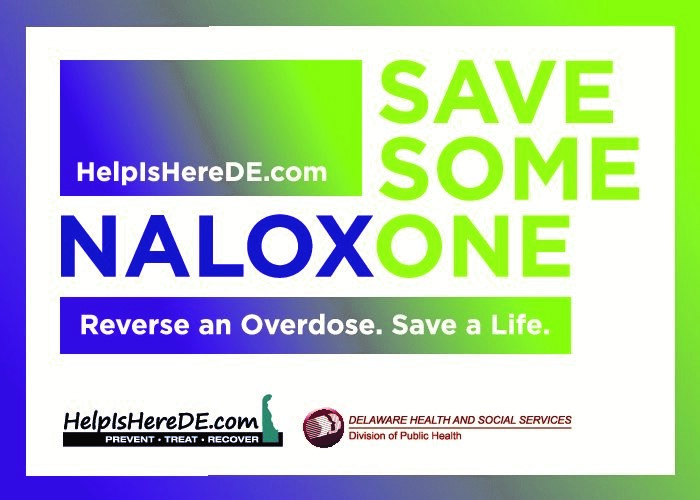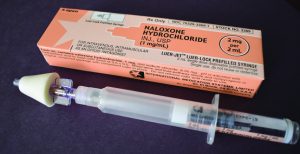DPH to Distribute Overdose Reversing Medication Naloxone March 20, 2019 in Dover
Delaware Health and Social Services | Division of Public Health | News | Date Posted: Friday, March 15, 2019
Delaware Health and Social Services | Division of Public Health | News | Date Posted: Friday, March 15, 2019

DOVER – In an effort to reduce the number of individuals dying from drug overdoses in Delaware, the Division of Public Health (DPH) will hold Community Naloxone Distribution events in each county throughout the month of March. DPH will distribute free naloxone kits to members of the general public from 5:30 p.m. to 8:30 p.m., on Wednesday, March 20, 2019, at Delaware Technical Community College, Terry Campus, 100 Campus Drive, Dover, DE 19904. The distribution event will be held in the Corporate Training Center, Rooms 408 and 412. Individuals are encouraged to stop by at any time during the event. Training takes approximately 15 minutes. 
Each naloxone kit will contain two doses of naloxone, and members of the community who attend these events will receive one-on-one training on how to administer the overdose-reversing medication. The Division of Substance Abuse and Mental Health (DSAMH) also will have representatives on hand to answer any questions about access to treatment for those struggling with substance use disorder.
About 80 percent of all overdoses happen in a private residence, whether it’s their own or someone else’s, which is why DPH is encouraging friends, family members, and those struggling with opioid addiction to have naloxone on hand. If family or friends of someone overdosing have naloxone immediately accessible, it can mean the difference between life or death for that person.
Within three to five minutes after administration, naloxone can counteract the life-threatening respiratory depression of an opioid-related overdose and stabilize a person’s breathing, which buys time for emergency medical help to arrive. DPH recommends calling 9-1-1 immediately if you find someone in the midst of a suspected overdose, starting rescue breathing, and then administering naloxone. Naloxone is not a replacement for emergency medical care and seeking immediate help and follow-up care is still vital.
Preliminary estimates for 2018 indicate 419 overdose deaths across the state, an increase of 21 percent from the 2017 total of 345 deaths, according to the Division of Forensic Science. The Centers for Disease Control and Prevention ranked Delaware number six in the nation for overdose mortality rate in 2017.
In 2018, first responders administered 3,728 doses of naloxone, compared to 2,861 in 2017, a 30 percent increase.
Funding for the Community Naloxone Distribution Initiative comes from state funding built into DPH’s budget for the first time in state fiscal year 2019, thanks to the advocacy of Lt. Governor Bethany Hall-Long and the Behavioral Health Consortium. In October, DPH also announced the agency was awarded federal funds to support the purchase of naloxone and other programs for first responders.
Community access to naloxone has increased significantly since 2014 when legislation was enacted making it available to the public. In 2017, Governor John Carney signed additional legislation ensuring pharmacists had the same legal protections as doctors, peace officers and good Samaritans when dispensing the medicine without a prescription.
Information on community training and pharmacy access to naloxone, along with resources regarding prevention, treatment and recovery are available at https://www.helpisherede.com/Get-Help/Overdose-Prevention.
A person who is deaf, hard-of-hearing, deaf-blind or speech-disabled can call the DPH phone number above by using TTY services. Dial 7-1-1 or 800-232-5460 to type your conversation to a relay operator, who reads your conversation to a hearing person at DPH. The relay operator types the hearing person’s spoken words back to the TTY user. To learn more about TTY availability in Delaware, visit http://delawarerelay.com.
Delaware Health and Social Services is committed to improving the quality of the lives of Delaware’s citizens by promoting health and well-being, fostering self-sufficiency, and protecting vulnerable populations. DPH, a division of DHSS, urges Delawareans to make healthier choices with the 5-2-1 Almost None campaign: eat 5 or more fruits and vegetables each day, have no more than 2 hours of recreational screen time each day (includes TV, computer, gaming), get 1 or more hours of physical activity each day, and drink almost no sugary beverages.
Related Topics: addiction epidemic, DE Division of Public Health, Naloxone, overdose response
Keep up to date by receiving a daily digest email, around noon, of current news release posts from state agencies on news.delaware.gov.
Here you can subscribe to future news updates.
Delaware Health and Social Services | Division of Public Health | News | Date Posted: Friday, March 15, 2019

DOVER – In an effort to reduce the number of individuals dying from drug overdoses in Delaware, the Division of Public Health (DPH) will hold Community Naloxone Distribution events in each county throughout the month of March. DPH will distribute free naloxone kits to members of the general public from 5:30 p.m. to 8:30 p.m., on Wednesday, March 20, 2019, at Delaware Technical Community College, Terry Campus, 100 Campus Drive, Dover, DE 19904. The distribution event will be held in the Corporate Training Center, Rooms 408 and 412. Individuals are encouraged to stop by at any time during the event. Training takes approximately 15 minutes. 
Each naloxone kit will contain two doses of naloxone, and members of the community who attend these events will receive one-on-one training on how to administer the overdose-reversing medication. The Division of Substance Abuse and Mental Health (DSAMH) also will have representatives on hand to answer any questions about access to treatment for those struggling with substance use disorder.
About 80 percent of all overdoses happen in a private residence, whether it’s their own or someone else’s, which is why DPH is encouraging friends, family members, and those struggling with opioid addiction to have naloxone on hand. If family or friends of someone overdosing have naloxone immediately accessible, it can mean the difference between life or death for that person.
Within three to five minutes after administration, naloxone can counteract the life-threatening respiratory depression of an opioid-related overdose and stabilize a person’s breathing, which buys time for emergency medical help to arrive. DPH recommends calling 9-1-1 immediately if you find someone in the midst of a suspected overdose, starting rescue breathing, and then administering naloxone. Naloxone is not a replacement for emergency medical care and seeking immediate help and follow-up care is still vital.
Preliminary estimates for 2018 indicate 419 overdose deaths across the state, an increase of 21 percent from the 2017 total of 345 deaths, according to the Division of Forensic Science. The Centers for Disease Control and Prevention ranked Delaware number six in the nation for overdose mortality rate in 2017.
In 2018, first responders administered 3,728 doses of naloxone, compared to 2,861 in 2017, a 30 percent increase.
Funding for the Community Naloxone Distribution Initiative comes from state funding built into DPH’s budget for the first time in state fiscal year 2019, thanks to the advocacy of Lt. Governor Bethany Hall-Long and the Behavioral Health Consortium. In October, DPH also announced the agency was awarded federal funds to support the purchase of naloxone and other programs for first responders.
Community access to naloxone has increased significantly since 2014 when legislation was enacted making it available to the public. In 2017, Governor John Carney signed additional legislation ensuring pharmacists had the same legal protections as doctors, peace officers and good Samaritans when dispensing the medicine without a prescription.
Information on community training and pharmacy access to naloxone, along with resources regarding prevention, treatment and recovery are available at https://www.helpisherede.com/Get-Help/Overdose-Prevention.
A person who is deaf, hard-of-hearing, deaf-blind or speech-disabled can call the DPH phone number above by using TTY services. Dial 7-1-1 or 800-232-5460 to type your conversation to a relay operator, who reads your conversation to a hearing person at DPH. The relay operator types the hearing person’s spoken words back to the TTY user. To learn more about TTY availability in Delaware, visit http://delawarerelay.com.
Delaware Health and Social Services is committed to improving the quality of the lives of Delaware’s citizens by promoting health and well-being, fostering self-sufficiency, and protecting vulnerable populations. DPH, a division of DHSS, urges Delawareans to make healthier choices with the 5-2-1 Almost None campaign: eat 5 or more fruits and vegetables each day, have no more than 2 hours of recreational screen time each day (includes TV, computer, gaming), get 1 or more hours of physical activity each day, and drink almost no sugary beverages.
Related Topics: addiction epidemic, DE Division of Public Health, Naloxone, overdose response
Keep up to date by receiving a daily digest email, around noon, of current news release posts from state agencies on news.delaware.gov.
Here you can subscribe to future news updates.